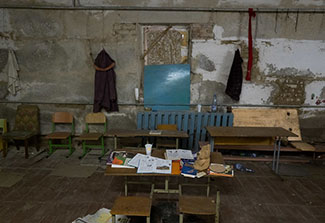This researcher wants to normalize mental health care in Ukraine
September/October 2023 | Volume 22 Number 5
 Photo courtesy of U.S. Department of State/Chuck Kennedy
The Yahidne School in Yahidne, Ukraine, where more than 360 people were forced to live for nearly a month in February and March 2022, is now being turned into a museum.
Photo courtesy of U.S. Department of State/Chuck Kennedy
The Yahidne School in Yahidne, Ukraine, where more than 360 people were forced to live for nearly a month in February and March 2022, is now being turned into a museum.
By Susan Scutti
A third of all Ukrainians have at least one lifetime experience of mental disorder, scientists estimate. Many believe the Russian 2022 invasion has exacerbated mental health issues, especially PTSD, depression and anxiety, yet the Ukrainian health care system is stretched beyond capacity, says Dr. Alona Mazhnaia, senior lecturer at National University of “Kyiv-Mohyla Academy” (NaUKMA) and principal investigator on a Fogarty project that seeks to understand delivery of mental health care in Ukraine. “Building the mental health care system has to move forward now. People already need services and we cannot wait until some unknown time when everything is less tumultuous.”
Local and international organizations have mobilized within Ukraine, providing mental health services and coordinating resources, she says. “There’s also large-scale training of primary care providers to deliver mental health services using mhGAP to their patients." Developed by WHO, the Mental Health Gap Action Program (mhGAP) includes interventions for prevention and management of priority conditions: depression, schizophrenia and other psychotic disorders, suicide, epilepsy, dementia, substance use disorders, and mental disorders in children.
“One other effort is what is called ‘psychoeducation’—normalizing taking care of your mental health. Normalizing talking about it. Normalizing the concept of mental health service providers. Normalizing asking others when you’re worried that they’re struggling.”
Legacy system & attitudes
Under the Soviet regime, psychiatric services were often used to punish politically inconvenient citizens and oppress targets of the regime, comments Mazhnaia. “It was a very punitive system so obviously people did not develop the habit of going to mental health service providers when they needed help.” Other barriers to widespread use of mental health services included delivery systems with difficult-to-access siloed care and a lack of evidence-based training for the providers themselves. Following Ukraine's independence, this began to change and, after the 2014 revolution, efforts intensified, says Mazhnaia.
The process of conceptualizing how mental health care might be delivered included formulating a new national strategy, “but that was happening at the usual slow speed of policy and regulatory framework development.” Her own five-year Fogarty project began during this period in 2021. At that time—the end stage of the COVID-19 pandemic—Mazhnaia hoped to gather information that might contribute to “closing the mental health treatment gap in Ukraine.”
All that changed in February 2022. “With full-scale invasion, this tremendous shock hit our society, so it all became very urgent,” Mazhnaia says. She revised her study to understand the landscape of mental health service providers in Ukraine, including their knowledge, attitudes, practices, and capacity for scaling-up mental health treatment approaches.
 Photo courtesy of Peter KilmarxActing Fogarty Director Dr. Peter Kilmarx met with current and Fogarty former trainees in Warsaw, Poland in June 2023, including Dr. Alona Mazhnaia.
Photo courtesy of Peter KilmarxActing Fogarty Director Dr. Peter Kilmarx met with current and Fogarty former trainees in Warsaw, Poland in June 2023, including Dr. Alona Mazhnaia.
Resistance in resilience
NaUKMA, which has received help from the EU, the U.S. and other countries, continues to support its researchers, in part, by providing temporary residences. “The pandemic is not comparable to the invasion, but, in terms of educational logistics, similar challenges exist. We learned how to teach online, so, following the invasion, we continued with this.” Still, Mazhnaia experienced interruptions due to bombs and power outages.
She has seen interest in public health swell in recent months: “There are people who are very motivated and dedicated to this topic who want to come and study in Kyiv, in the heart of Ukraine, and to contribute to our public mission.” Many programs now focus on psychosocial aid because many scientists, public health officials and the wider society have begun to recognize how crucial it is and how long people have needed it, she adds.
The crisis means real needs must come first and research is secondary, says Mazhnaia. Though she does not provide services on the frontlines, she finds it humbling to contribute in her own way to the goal of working for better health for all.
"To continue on is a form of resistance. Resilience is not something that is inherited—it is something that is earned by existing during a time when you simply must endure.”
More information
Updated October 17, 2023
To view Adobe PDF files,
download current, free accessible plug-ins from Adobe's website.
Related Fogarty Programs
Related World Regions / Countries
Related Global Health Research Topics